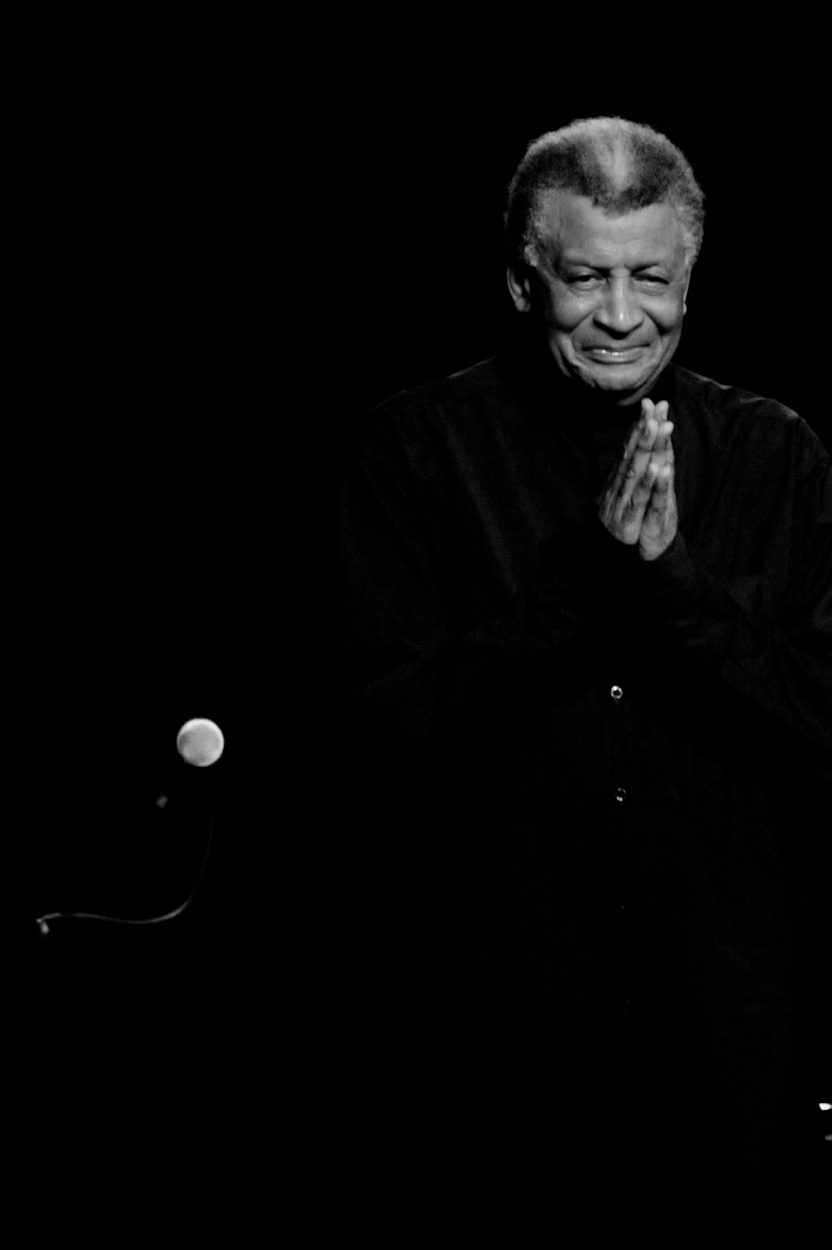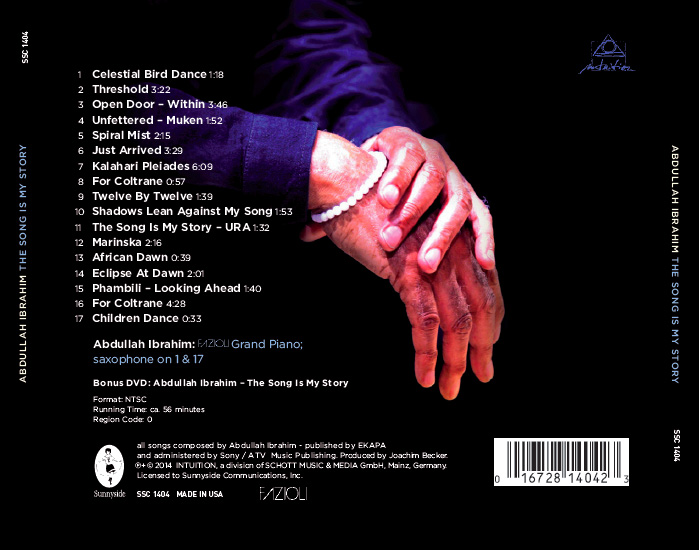Share This
Album at a Glance
Tags
Related Posts
Abdullah Ibrahim: The Song is My Story
Posted by Robert Tefft on Feb 23, 2015 in Jazz | 0 comments
“You know, he is still a great sax player,” I tell myself while listening to Abdullah Ibrahim’s ‘Celestial Bird Dance,’ the opening number of his 2015 Sunnyside release,The Song Is My Story. A series of solo explorations – two on saxophone, fifteen on piano – , the disc is a welcome reminder that Mr. Ibrahim continues to be one of the jazz world’s treasures.
Born Adolph Johannes Brand in 1934, he joined his first band, the Jazz Epistles, in 1960. The fifty-five years since then have seen innumerable highlights, including his 1966 sponsorship by Duke Ellington that led to recordings for Reprise Records, as well as wider recognition. The 1974 release of Mannenberg, 1979’s African Marketplace, 1988’s Chocolat soundtrack, 1997’s duet with Max Roach and 1998’s African Suite for Jazz Trio and String Orchestra mark major milestones in a lifetime of important music making.
In 2014, Abdullah Ibrahim visited the workshop where the legendary Fazioli grand pianos are crafted. These recordings reflect the excellence that a first rate understanding of sound and music can bring to a solo piano recording. The second track, ‘Threshold,’ a slow-motion contemplation of Ellington, Monk and Debussy, introduces the piano and the artistic gravitas permeating this disc, a perfect illustration of Mr. Ibrahim’s cover quote, “improvisation is meditation in motion.”
As the disc continues, Ibrahim explores themes from throughout his life, some of them new improvisations such as ‘Unfettered Muken,’ one of the strongest themes here, or ‘Just Arrived,’ which shows a hint of his love of classical music in its opening. ‘Kalahari Pleiades’ is a 1970 composition conveying a sense of extended exploration and how music slowed down can be music savored and revealed. At 6’09” it is the longest piece here, but each moment is a revelation. On the other hand, short fragments including “For Coltrane” at 0:57” and “Twelve by Twelve” at 1’39” give a unique sketchbook version of jazz piano; ‘sometimes he who says least means the most’ is an adage oft forgotten in an idiom better known for extended works. The more you listen the more you hear in compositions such as ‘Eclipse at Dawn’ and ‘Phambili – Looking Ahead.’ The fifty-six minutes of this disc just seem richer with each repetition. The Song Is My Story is a story you need to know.
We can celebrate several anniversaries simultaneously with legendary pianist Abdullah Ibrahim’s new recording, The Song Is My Story. First, there is the 80th birthday of one of the most significant musicians in the world. We are also reminded of the time 40 years ago when Ibrahim composed "Mannenberg," which quickly became the hymn of the slums and townships of South Africa. Finally, we can celebrate the end of South African apartheid, which ended 20 years ago.
Ibrahim was born as Adolphe Johannes Brand in that country of unequal rights. He called himself Dollar Brand as an adolescent. He began playing piano when he was seven and became a "professional musician" at fifteen. He emigrated to Europe–still as Dollar Brand–in 1962, where Duke Ellington discovered him shortly thereafter. He then moved to the United States. That marked the beginning of his international career, which has lasted until this day. Ibrahim has converted to Islam, in the meantime, and returned to Europe long ago. Then he changed his name again and has been known as Abdullah Ibrahim worldwide for decades.
His musical style is difficult to describe, even when you repeatedly hear themes from African melodies and harmonies. In addition, you can't miss the influence of great peers and legends such as Thelonious Monk. Ibrahim, in an interview with the magazine Zeit in 2013, stated:
"I have always sought for a specific sound my whole life. At the end of the 60s—I lived in New York at that time—this search became worse and worse. I walked the streets day and night, a restless African in America, who did not understand what was driving him. It wasn't the sound, but the silence, the silent moments in music."
Perhaps it is this which fascinates millions of people: Abdullah Ibrahim's treatment of time, space and silence. Three dimensions of music, which he—and probably only he—celebrates like a prayer put to music. It is not without reason that he writes on the CD cover: "Improvisation is meditation in motion".
Ibrahim said in the same interview: "There are people who can only play if they have sheet music. But we others improvise without knowing where we are headed. This makes us free. We don't fear situations that we don't know. We have a song, rhythm, harmony and pitch, and then we start to play with that, turn everything upside down … We jazz musicians are not afraid of letting things take their course."
However, the term "jazz musician" is a corset, which is much too constricting for this great personage, who has not lost any of his radiance. His music is "world" music in the greatest sense of the word. It not only links sounds of different genres and musical traditions, but also music with poetry, sound with feelings, melodies with stories – and people with people.
Abdullah Ibrahim visited Italy in the summer of 2014, played on the legendary "Fazioli" grand piano and visited the workshop where these exquisite pianos are crafted. There is a concert hall there with fantastic instruments, which sound as if they were created especially for Ibrahim. Abdullah Ibrahim recorded The Song Is My Story there as a free improvisation, for the most part. Fortunately, professional films were shot during these performances, which helped to provide a DVD with concert excerpts as well as impressive comments by, and conversations with, Abdullah Ibrahim.
Source: Sunnyside Records
 Abdullah Ibrahim |
Abdullah Ibrahim, piano & composition Abdullah Ibrahim (born Adolph Johannes Brand on 9 October 1934 and formerly known as Dollar Brand) is a South African pianist and composer. His music reflects many of the influences of his childhood in the multicultural port areas of Cape Town, ranging from traditional African songs to the gospel of the AME Church and ragas, to more modern jazz and other Western styles. Ibrahim is considered the leading figure in the subgenre Cape jazz. Within jazz, his music particularly reflects the influence of Thelonious Monk and Duke Ellington. With his wife, the jazz singer Sathima Bea Benjamin, he is father to the New York underground rapperJean Grae, as well as to a son, Tsakwe. Ibrahim has worked extensively as a solo performer, typically in unbroken concerts that echo the unstoppable impetus of the old marabi performers, classical impressionists and snatches of his musical idols - Ellington, Thelonious Monk and Fats Waller. He also performs frequently with trios and quartets and larger orchestral units. Since his return to South Africa in the early 1990s, he has been feted with symphony orchestra performances, one of which was in honour of Nelson Mandela’s 1994 inauguration as President. In 1997, Ibrahim collaborated on a tour with drummer Max Roach, and the following year undertook a world tour with the Munich Radio Philharmonic Orchestra. In 1999, he founded the “M7” academy for South African musicians in Cape Town and was the initiator of the Cape Town Jazz Orchestra, an 18-piece big band launched in September 2006. Ibrahim continues to perform internationally, mainly in Europe, and with occasional shows in North America. Source: Wikipedia |
![]() About Robert Tefft
About Robert Tefft
Twitter •
| Thinking about purchasing this album?
Follow this link for more album details or to make the purchase. Buy it now |
“Not just recommended. Guaranteed.”
We stand behind every album featured on Expedition Audio. Our objective is to take the monetary risk out of music exploration. If you order this album from HBDirect.com and do not like it you can return it for a refund.







0 Comments
Trackbacks/Pingbacks